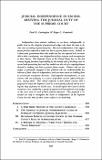|
Reseña:
|
Independence from extrinsic influence is, we know, indispensable topublic trust in the integrity of professional judges who share the duty to decidecases according to preexisting law. But such independence is less appropriatefor those expected to make new law to govern future events. Indeed, ina democratic government those who make new law are expected to be accountableto their constituents, not independent of their interests and unresponsiveto their desires. The Supreme Court of the United States has in the lastcentury largely forsaken responsibility for the homely task of deciding cases inaccord with preexisting law and has settled into the role of a superlegislaturedevoted to making new law to govern future events. Citizens who see ourjudges as primarily engaged in this political role are understandably lesstolerant of their claim to independence and are more intent on holding themto account for unwelcome decisions. Such popular dissatisfaction, or evenunrest, with our judiciary is a source of prudent concern expressed by Justices,among others. This Article responds to that shared concern with aproposal to restore the Supreme Court to a more purely judicial role by revivingthe duty of Justices to decide cases. It would require the Court to decidenumerous cases certified by a group of experienced lower federal court judgesas the cases most in need of their judicial attention. This proposal is intendednot only to strengthen the claim to independence of the SupremeCourt, but also that of other courts subject to its leadership.INTRODUCTION . . . . . . . . . . . . . . . . . . . . . . . . . . . . . . . . . . . . . . . . . . .Independence from extrinsic influence is, we know, indispensable topublic trust in the integrity of professional judges who share the duty to decidecases according to preexisting law. But such independence is less appropriatefor those expected to make new law to govern future events. Indeed, ina democratic government those who make new law are expected to be accountableto their constituents, not independent of their interests and unresponsiveto their desires. The Supreme Court of the United States has in the lastcentury largely forsaken responsibility for the homely task of deciding cases inaccord with preexisting law and has settled into the role of a superlegislaturedevoted to making new law to govern future events. Citizens who see ourjudges as primarily engaged in this political role are understandably lesstolerant of their claim to independence and are more intent on holding themto account for unwelcome decisions. Such popular dissatisfaction, or evenunrest, with our judiciary is a source of prudent concern expressed by Justices,among others. This Article responds to that shared concern with aproposal to restore the Supreme Court to a more purely judicial role by revivingthe duty of Justices to decide cases. It would require the Court to decidenumerous cases certified by a group of experienced lower federal court judgesas the cases most in need of their judicial attention. This proposal is intendednot only to strengthen the claim to independence of the SupremeCourt, but also that of other courts subject to its leadership. |

